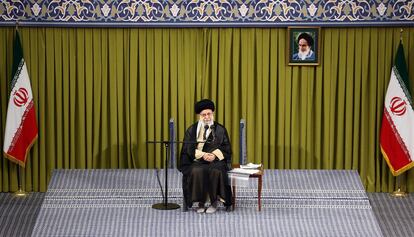Israel-Hamas war deepens divisions in Iran
The regime’s support for the Palestinian militia arouses little sympathy in a country rocked by a severe economic crisis

Iran’s supreme leader, Ayatollah Ali Khamenei, warned in mid-October of the unstoppable mobilization of Muslims if the Israeli bombardment of Gaza continued. Undoubtedly, there have been numerous demonstrations of solidarity with the Palestinians in Muslim-majority countries, but significantly many Iranians have distanced themselves from the conflict, aligning themselves instead with Israel. The complicity of the Islamic Republic’s leadership with Hamas and other militias that form the so-called “Axis of Resistance” is widening the gap between the regime and Iranian society.
The distance between official policy and public opinion was immediately apparent. The day after Hamas launched its savage assault on Israel, the Persepolis soccer club hosted Gol Gohar Sirjan FC, a team from the Kerman province, in Tehran’s Azadi stadium. The match organizers wanted to raise the Palestinian flag as a sign of support for the attack. The response from the stands was immediate. Almost in unison, the attendees (women are still banned from Iranian stadiums) chanted: “Stick the Palestinian flag up your ass...”
The anecdote is pertinent because soccer stadiums are, along with mosques, one of the few public spaces where Iranians are allowed to congregate. The vulgarity, which in Persian is even more forceful than in English, was a rejection of the use of soccer for political purposes, while also denouncing the Iranian regime’s involvement in regional conflicts at the expense of the needs of its population. I was not surprised by the rection.
Zionist regime’s crimes have crossed the red lines, which may force everyone to take action. Washington asks us to not do anything, but they keep giving widespread support to Israel. The US sent messages to the Axis of Resistance but received a clear response on the battlefield.
— سید ابراهیم رئیسی (@raisi_com) October 29, 2023
During my travels in Iran as a correspondent for EL PAÍS, I often heard complaints about aid to Palestine and the Lebanese Hezbollah militia, especially from ethnic and religious minorities who perceived it as a comparative grievance. Now, with the country in the grip of a severe economic crisis resulting from both international sanctions and financial mismanagement, the diversion of funds for foreign military conflicts is intolerable.
Since the day of the match, the hashtag #IraniansStandWithIsrael has become popular on social networks. Under this slogan, users denounce the Islamist regime of Iran (Shiite) and Hamas (Sunni), equating their brutality. This is not an automatic rejection of the Palestinian cause. Indeed, some add the hashtag #FreePalestineNow. But more often they express support for Reza Pahlavi, son of the last Shah, without whose (unlikely) return to Iran they consider peace in the Middle East impossible. It is clear from the images disseminated that most of the accounts belong to Iranian exiles. Even so, their criticism has caused alarm among the rulers of the Islamic Republic.
Iranian people chanting to the directors of the game who raised the Palestinian flag during a football match momens ago:
— Persian God (@RealPersianGod) October 8, 2023
"Shove the Palestinian flag up your ass!"#IraniansStandWithIsraelpic.twitter.com/TMwYfoa9ns
The attorney general announced on October 31 that any pro-Israel demonstration on social networks constitutes a crime. The warning came after the committee in charge of establishing cases of criminal content updated a 2020 law to “confront the Zionist regime’s hostile actions against peace and security.” The revision also specifies that any relationship with Israeli citizens, including friendship, is prohibited. Iranian athletes were already forbidden from competing with rivals of Israeli nationality and the filmmaker Mohsen Makhmalbaf, who has been living in self-imposed exile since 2005, was punished for participating in a competition in Jerusalem by having his prizes removed from the Cinema Museum of Iran.
This is not just another step in the anti-Israeli policy implemented by the Shiite Islamists when they came to power after the 1979 revolution. Unlike the good relations that monarchic Iran maintained with Israel, the Islamic Republic rejects its existence as a state and its leaders frequently make bombastic calls for its destruction. However, on this occasion, the zeal to silence the slightest expression of sympathy for the victims of the Hamas attack goes beyond official anti-Zionism and the self-serving use of the Palestinian cause.
The tone exudes concern over the internal impact of this policy, at a time when the regime is facing a growing social protest. Those in power want to prevent the opponents’ campaign abroad from permeating internally. “So much fear because they know that the majority hates them,” as an exile says in the face of such drastic measures.
Sign up for our weekly newsletter to get more English-language news coverage from EL PAÍS USA Edition
Tu suscripción se está usando en otro dispositivo
¿Quieres añadir otro usuario a tu suscripción?
Si continúas leyendo en este dispositivo, no se podrá leer en el otro.
FlechaTu suscripción se está usando en otro dispositivo y solo puedes acceder a EL PAÍS desde un dispositivo a la vez.
Si quieres compartir tu cuenta, cambia tu suscripción a la modalidad Premium, así podrás añadir otro usuario. Cada uno accederá con su propia cuenta de email, lo que os permitirá personalizar vuestra experiencia en EL PAÍS.
¿Tienes una suscripción de empresa? Accede aquí para contratar más cuentas.
En el caso de no saber quién está usando tu cuenta, te recomendamos cambiar tu contraseña aquí.
Si decides continuar compartiendo tu cuenta, este mensaje se mostrará en tu dispositivo y en el de la otra persona que está usando tu cuenta de forma indefinida, afectando a tu experiencia de lectura. Puedes consultar aquí los términos y condiciones de la suscripción digital.









































